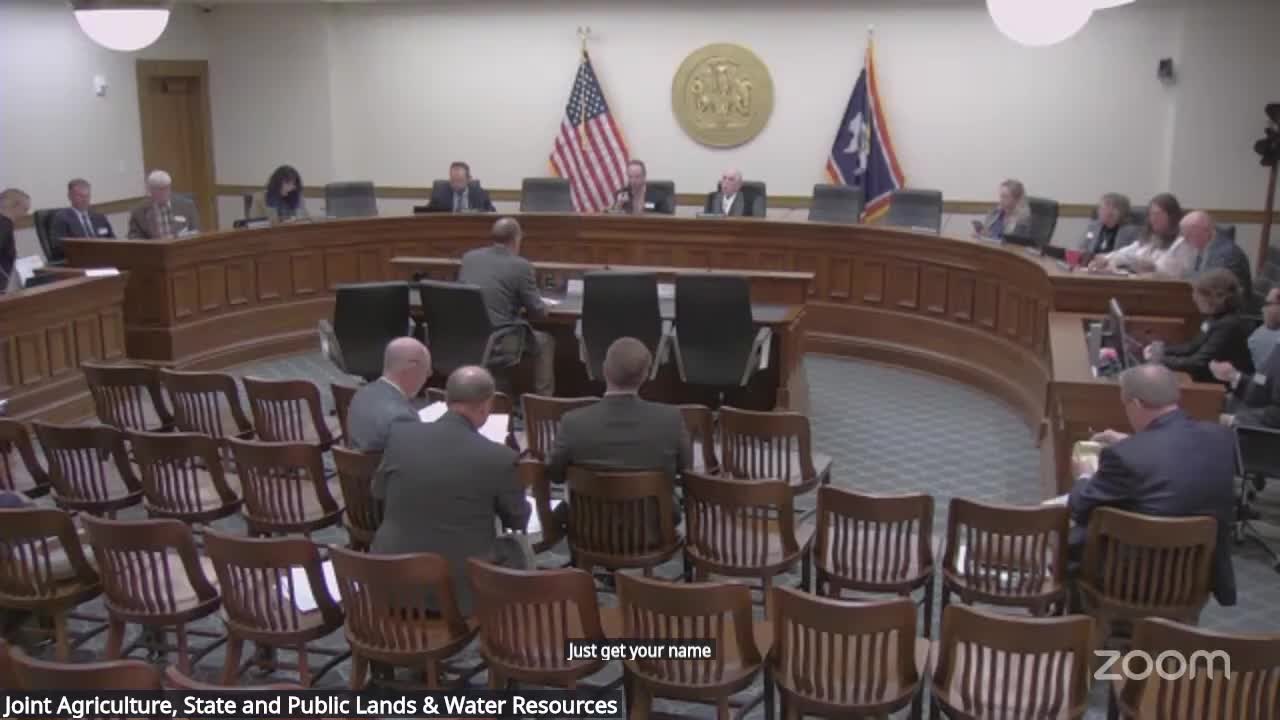Wyoming committee deadlocks on 10-year cloud seeding moratorium
Get AI-powered insights, summaries, and transcripts
Subscribe
Summary
The Agriculture, State & Public Lands & Water Resources Committee considered a 10-year moratorium on cloud seeding and related weather-modification activities but failed to advance the bill after a 5-5 tie. Lawmakers and public witnesses sharply debated scientific uncertainty, emergency exceptions and enforcement details.
The Agriculture, State & Public Lands & Water Resources Committee on Oct. 30 considered 26LSO0210, a proposed 10-year moratorium on cloud seeding and similar weather-modification activities but did not advance the bill after a 5-5 tie vote.
The proposal would have suspended activities authorized under Wyoming’s weather-modification statutes (W.S. 9-1-1905 through 9-1-1909) and created criminal penalties and fines for unauthorized operations during the moratorium. Committee discussion focused on whether emergencies (wildfire suppression, flood control or public safety) should be exempted, how to define an authorization process and whether the state should fund baseline studies of cloud-seeding effects.
Brad Brooks, representing the City of Cheyenne Board of Public Utilities and speaking also as a Colorado River Advisory Committee member, urged the committee to weigh the operational value of cloud seeding for municipal water supply. “I’ll buy all the water I can for 80 some dollars an acre foot if you can tell me where it's at,” Brooks said, arguing that the unit cost sometimes quoted for cloud-seeding-produced water could be affordable relative to other sources. Brooks also cautioned that establishing a hydrologic “baseline” would be difficult because natural hydrology is highly variable.
By contrast, Casper resident Jamie Locke testified in support of the moratorium, saying existing research shows only modest increases in precipitation from cloud seeding and raising fairness concerns about redistributing moisture between regions. “I respectfully urge a yes vote to move this bill forward,” Locke told the committee during public comment.
Committee members pressed staff and counsel about specific statutory cross-references and implementation mechanics. Representative Johnson and others asked who would authorize cloud-seeding activities during the moratorium, and Miss Johnson (committee staff) noted there was not a clear, preexisting authorization process spelled out in the bill draft.
Lawmakers considered and voted on several amendments. An amendment offered by Senator Pearson to change the bill’s agency referral language (striking “aeronautics” and inserting “water resources and environmental quality”) passed by voice vote. The committee defeated — unanimously, according to the transcript — an amendment that would have explicitly exempted "emergency atmospheric operations" conducted under the governor’s direction. Other proposed amendments to add a funded baseline study were debated and then withdrawn; the committee also moved to remove requirements that agencies conduct studies where funding was not provided.
After extended debate and multiple procedural votes, the committee took a formal roll-call on whether to advance the bill as amended. The final tally was five in favor and five opposed, resulting in no advancement from committee. The transcript records the committee chair concluding, "I guess it doesn't pass." The recorded roll call is summarized in the committee minutes as 5 yes, 5 no; the motion therefore failed.
The transcript shows the committee wrestled repeatedly with two recurring issues: (1) how to authorize or exempt emergency operations such as wildfire suppression without creating open-ended authority for either the governor or federal actors; and (2) whether, and how much, the state should invest in new baseline monitoring or studies while a moratorium would reduce opportunities to measure cloud-seeding yields.
With the moratorium vote blocked by the tie, the committee did not adopt a final policy change on cloud seeding. Committee members said they expected the topic to reappear in future drafts or in session legislation, and speakers urged lawmakers to clarify which agencies would hold permitting and enforcement responsibilities if a moratorium or stricter restrictions are proposed again.
Votes and formal actions recorded in committee minutes include several amendment results and the final vote tally; the transcript contains the public testimony and a series of committee-to-staff exchanges about statutory citations and rulemaking authority.
The committee did not adopt a package of funded monitoring measures tied to this moratorium, and several members expressed concern that the bill as written would complicate interstate compact negotiations in basins such as the Colorado River.
Ending note: The moratorium bill (26LSO0210) failed to pass out of committee by tie vote; lawmakers left unanswered questions on emergency exemptions, the definition of authorization, and whether to fund baseline studies or monitoring going forward.
